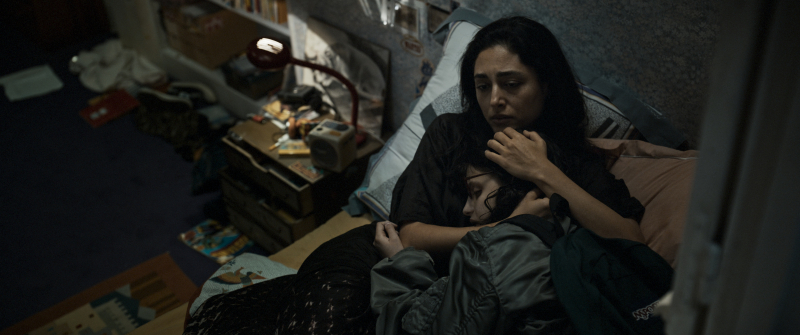
Mandarin & Compagnie – Kallouche Cinema – Frakas Productions – France 3 Cinema
MOVIE REVIEW
Alpha (2025)
I wasn’t a fan of “Titane,” and much of my aversion could probably be attributed to its undeserved Palme d’or win. To my pleasant surprise, Julia Ducournau’s Cannes Film Festival competition follow-up, “Alpha,” is nothing like it. The film is far more artful and mature, which just goes to show that the New French Extremity filmmaker was merely lauded prematurely. Though elements of body horror seen in “Titane” and “Raw” are still very much present, the new film better qualifies as a ghost story and a coming-of-age tale set in the Twilight Zone.
It opens with preschooler Alpha (Ambrine Trigo Ouaked) connecting the track marks on the arm of her junkie uncle, Amin (Tahar Rahim). Then the story fast forwards eight years, to when the teenage Alpha (Mélissa Boros) passes out at a classmate’s seedy party and gets tattooed on her arm without her consent. She bleeds profusely, which is alarming since there’s an unnamed deadly virus out there that gradually turns people’s flesh into stone and causes them to cough up dust.
Alpha’s mother (Golshifteh Farahani), a doctor in a hospital bursting at the seams with patients afflicted with the virus, makes sure her child promptly receives a tetanus shot and follows up with additional testing. While it’s still too early to tell if Alpha has caught anything, that doesn’t stop her classmates from bullying her mercilessly under the assumption that she’s contagious. To make matters worse, Amin reappears after years of absence, and Alpha, who neither recognizes nor remembers him, must share her bedroom with him. Past and present sometimes collide, as do dreams and reality. The film may warrant repeat viewings to fully decode it.
The aesthetics here are fascinating. Visually, Ms. Ducournau achieves stark realism with a decaying slum backdrop tattered with graffiti, marginalized characters and Ruben Impens’s handheld photography. But through Tradition of Quality classical musical cues, she prods us to read it all as something else entirely, perhaps an epic Greek tragedy. And by the end, her classicist aspirations become wholly transparent as Beethoven’s Symphony No. 7 lifts the film to a soaring climax. Ms. Ducournau’s bold vision pays off handsomely.
“Alpha” also possesses the emotional depth that “Titane” sorely lacked. The real horror here isn’t the body variety but that of being different and ostracized. The family’s ethnic background isn’t just window dressing, as Ms. Ducournau meaningfully explores the generation gaps, the French-Berber language barrier and cultural divides such as religion, dietary restrictions and the gulf between superstition and science. These forces are evidently too great for love to conquer.
Mr. Ramin, best known for his own star-making turn in “A Prophet,” delivers a layered performance as a tormented and volatile man trammeled by demons, but he’s hardly the main attraction here despite receiving top billing. Though this is apparently her second role, Ms. Boros has cemented herself as a talent to be reckoned with. Ms. Farahani is equally superb as a woman who seems to have done everything right but is still unable to shield her loved ones from harm and trauma. Turns out “Alpha” is not only the coming-of-age tale of the daughter, but of the mother as well.
Comments